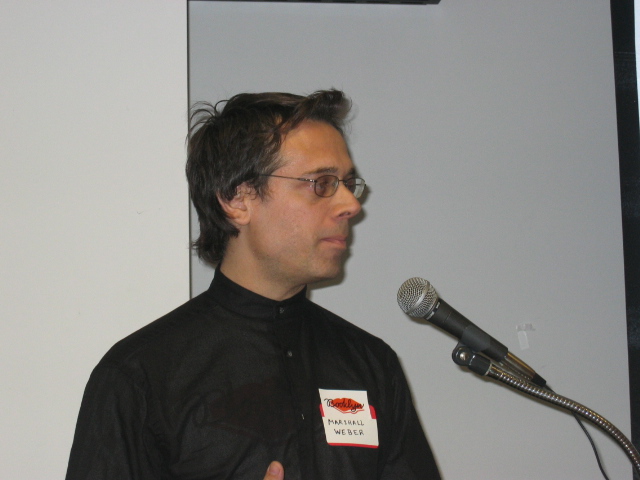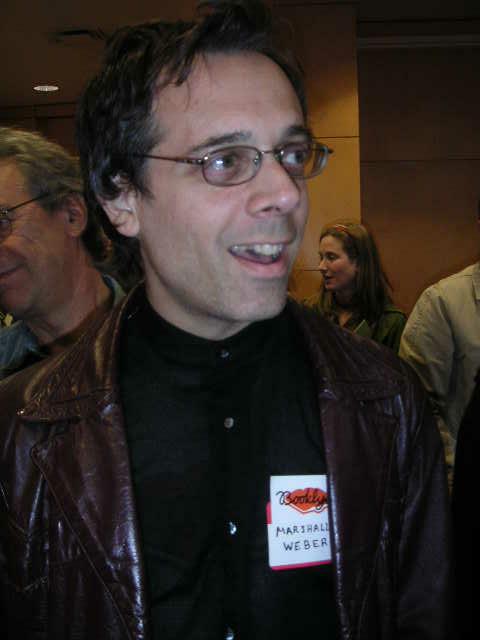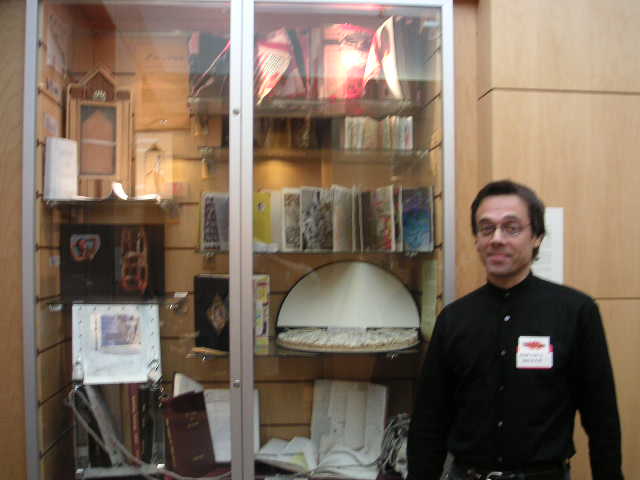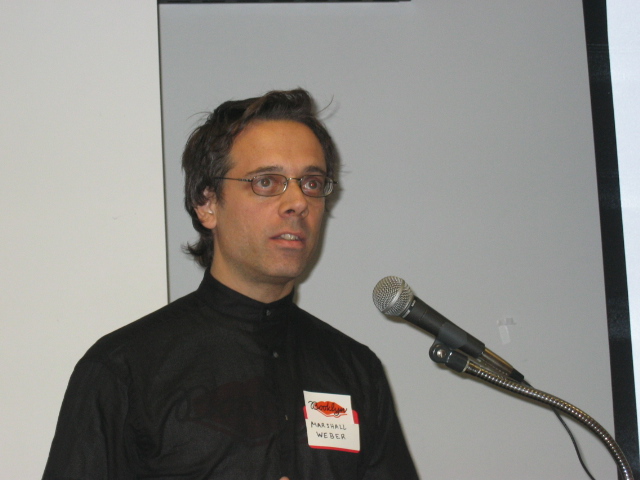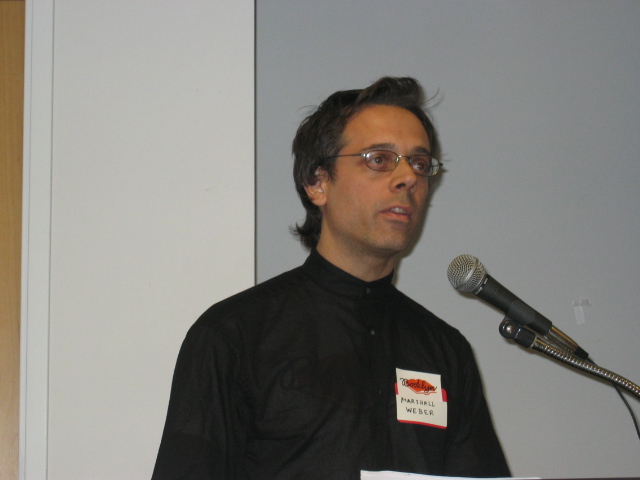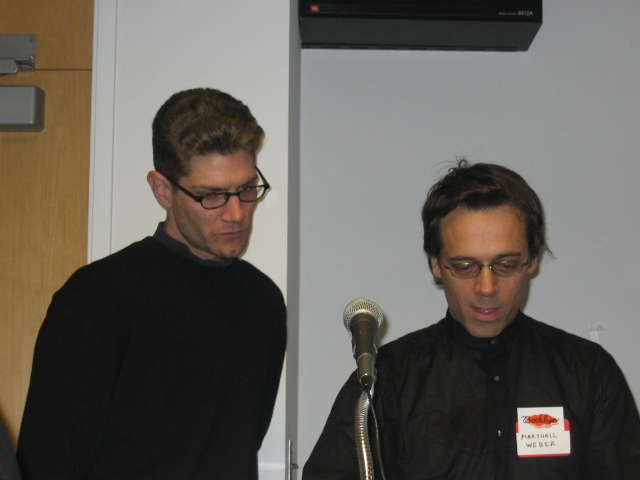Ninth Annual New Jersey Book Arts Symposium
Styles of Collecting, Styles of the Book
Morning Panel: Marshal Weber
Speaking third, Marshal Weber, an artist and a director of the collective, Booklyn Artists' Alliance, prefaced his prepared remarks with an improvised and eloquent statement against the war in Iraq and the persecution of Arabs and Moslems in the US, paraphrasing Martin Niemoller's famous text (which begins "[i]n Germany, they first came for the Communists, and I didn't speak up because I wasn't a communist"). He declared, to ringing applause, that "it is in the things we talk about today that we can defeat war and tyranny;" and, "it is my job to perform an element of dissent . . . it's part of the culture of art making." (In her summary remarks, Judith K. Brodsky would repeat a variation upon this idea that art can ground an effective resistance to war, or that choosing art is itself a rejection of war.) Mr. Weber then said he would be talking about Booklyn by rearranging passages collaboratively written (by Marshall himself, with assistance from Amy Ferrara, Emily Larned, Mark Wagner, and Eleanor Whitney) for the Artists' Books Yearbook, 2003-2005, edited by Sarah Bodman (Bristol, Great Britain: Impact Press, 2003). [A shorter version of the published essay reproduced and performed at the Symposium can be seen at the Booklyn Website on the page entitled An Essay on Booklyn Style]. Sketching out the genesis of Booklyn, Mr. Weber noted that "Booklyn originated from the Bookmobile, the distribution vehicle of Christopher Wilde's Artichoke Yink Press, originally located in Madison, Wisconsin." "Wilde and accomplice Shon Schooler (entomologist and proprietor of Blue Barrel Press) drove a trailer loaded with artists' books around the United States, placing artwork directly into the hands of astounded librarians and curators." After relocating to Brooklyn in 1999, the AYP evolved into what now consists in "over forty associated artists and one hundred affiliated institutions, with various programs serving thousands of people every year." Asking "Why Booklyn," Mr. Weber replied (skimming from the wonderfully rich ABY 2003-2005) "Booklyn flourishes because there is a basic need in the book arts field for an organization committed to serving the public and professional artists. Booklyn is possible because there is an enthusiastic group of publishers, artists and institutions committed to the maturation and expansion of the field and medium of artists' books." and "Artists books are the rare books of the future and librarians appreciate the form as a valuable tool for both reactivating their collections and as bridges to the future of the library as a multi-media depository of interdisciplinary knowledge." While he spoke, Mr. Weber scampered around the artists' pages on the Booklyn web, touching lightly upon pages, both of artists present in the audience (such as Béatrice Coron), and artists not present. He noted that the collection policy statements and definitions rehearsed by the members of the panel had not been prescriptive, that rather than moving toward or evincing a desire for a consensual definition of artists' books, the panelists (and coll. devel. pol. statements iterated by the panelists) were exploring the spectrum of possibilities--which, it seems to me, added a useful layer of complexity to the dichotomy we had been given of curatorinstitution. While abandoning the lexicographical valence of "artists' books" may not have eased anyone's discomfort with the evanescence of the term, placing curating and collecting on the side of creatively servicing the cause of diversity made the overall project of collecting artists books seem a more coherent exercise, and the individual efforts of local collectors less isolated or provincial. And again, in this important regard, Mr. Weber connected with the notion of a reflexive dynamic proposed in the very title of the Symposium (and treated in the introductory remarks), by commenting "I have a notion that all artists are curators and all curators are collectors because it all boils down to aesthetic and social decisions." In contradistinction to the focus on inexpensive materials adopted by Dr. Sackner, Mr. Weber made a crisp, compensatory set of arguments for the high-end artists' books, noting not only that there was a "real market at play," but that making work commanding a high price was "an important part of how [artists] value what they do." Mr. Weber also noted that while "we love dead artists and writers," Booklyn undertook to focus on new work and "committed to emerging artists and helping them enter the field." Among other topics covered in his presentation, Mr. Weber asserted that Booklyn was "most interested in codex form," that "we [Booklyn Alliance artists] like a good look-see, and a good read, and we like our hand to feel and think and see as well." Artists Books were "not about modernism or materialism," and that we "think about the artists' book as an alternative to mass spectacle." Tacking between articulating Booklyn aesthetics and expressing his own, Mr. Weber commented that he derived a way of looking at the integration of image and text from Elaine Scarry's discussion of "fusing [the] neurological activities" of seeing [art] and reading in Dreaming by the Book. He also remarked, somewhat wistfully it seemed, at how much of what he'd said "had been said by everyone else," and yet I think nobody in attendance would have mistaken Mr. Weber for anything less than an engaging artist of unusual powers of persuasion with an original and amusing turn of mind.
LOST and FOUND [PDF]
